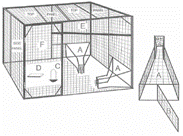Eastern Wildlife Damage Control Conferences

Eastern Wildlife Damage Management Conference: 8th (1997)
Date of this Version
10-1-1997
Document Type
Article
Abstract
Because effective deterrents are hard to find, it has been suggested that methyl anthranilate (MA) be applied to the surface of fish ponds to discourage bird predation. We conducted two short-term evaluations of a formulation for this use, ReJeX-iT TP-40. First, we assessed the response of tropical fish to TP -40 applications in small wading pools. After 15 minutes, all fish virtually were motionless at or near the bottom of the pool. Fish in the control pools actively swam and most were within 3 cm of the surface of the pool. No mortality occurred, and fish activity returned to almost normal after 24 hrs. We also conducted feeding trials with captive -reared great egrets (Casmerodius albus), one of several bird species that regularly preys upon fish at aquaculture facilities. Birds were allowed to capture fish from untreated pools, and then the trials were repeated with 2 rates of TP -40 application. There were no differences in the number of fish eaten or in latency to first strike between the pretreatment day and either of the treatment days. The handling time increased markedly, however, as treatment rate increased. Although the TP -40 treatments appeared to bother the birds, the irritation was insufficient to prevent the egrets from feeding on fish in the ponds. In more natural feeding conditions, where fish availability and capture is not as predictable, such an increase in handling time might sufficiently alter the cost-benefit equation to discourage further use of a treated pool.


Comments
Published in Proceedings of the Eighth Eastern Wildlife Damage Management Conference, Roanoke, Virginia, October 16–19, 1997, edited by James A. Parkhurst. Copyright © 1997 by the authors.